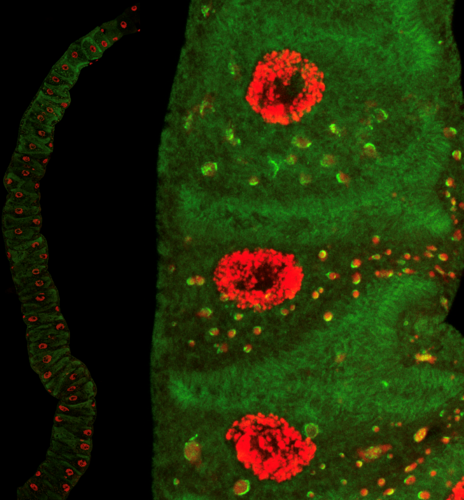The chemical complex that regulates body zinc storage
03.08.2022Zinc deficiency compromises the immune system against viral infections and is a global public health problem. Through experiments at the Swiss Light Source SLS and BESSYII, researchers gained new insights into zinc storage, with implications for understanding COVID-19 severity.
Zinc deficiency is a pervasive global health problem that results in a weakened immune system in adults and especially in children. In Mexico, this condition is thought to affect around 20 % of the population, representing a substantial burden on health systems. Seeking explanations, researchers from the Center for Research and Advanced Studies of the National Polytechnic Institute in Mexico (Cinvestav) teamed up with international synchrotron experts and gained new insights from studying Drosophila fruit flies, which are known to be a model system for human zinc metabolism.
Thanks to beamtime at the Swiss Light Source SLS (PSI) and BESSY II, they were able to show that the zinc stores in Drosophila flies depend on the tryptophan content of their diet. Using advanced X-ray absorption spectroscopy at the two synchrotrons, the researchers compared material isolated from flies with or without zinc stores. With the help of X-ray absorption spectroscopy at the SuperXAS beamline of SLS, they could decipher how zinc is bound and subsequently quantify the amount of zinc bound to proteins or stored in small inorganic compounds.

Nils Schuth, postdoctoral researcher at Cinvestav explains, “We took organs from a fruit fly and performed direct measurements of the tissue. We gained very revealing data, which showed a dramatic difference in zinc environment in flies with or without zinc stores. That was the first step, which already brought us forward. In a second step at SLS, we then compared the biological results with various synthesized chemical complexes. To our excitement, these experiments at SLS showed, for the first time, that the difference in zinc storage could be explained by the presence of these synthetic chemical complexes in the fly organ.”
«Patients presenting severe symptoms of COVID-19 frequently showed increased kynurenine and decreased zinc in their blood. This suggests that kynurenine is a signal and source for intracellular storage of zinc also in humans, and that prolonged absence of circulating zinc could be detrimental during the course of the disease.» Fanis Missirlis, Professor of Physiology at Cinvestav
The experimental results, published in the journal Proceedings of the National Academy of Sciences, bridge a gap between chemical processes and biological functions. They reveal the existence of a new chemical complex of zinc with kynurenine, a tryptophan product known to be involved in a number of important physiological functions in the cell. By providing a direct molecular connection between zinc and kynurenine, the research thus uncovers a new physiological function for tryptophan-derived kynurenine: to facilitate zinc storage sites within cells.
The research on fruit flies is a significant contribution towards better understanding zinc retention in humans and could help in developing dietary supplements. Furthermore, researchers hypothesise that the link between zinc and kynurenine – both well-known regulators of the innate and adaptive immune response – could be linked to severity of symptoms observed in COVID-19 patients. “Patients presenting severe symptoms of COVID-19 frequently showed increased kynurenine and decreased zinc in their blood. This suggests that kynurenine is a signal and source for intracellular storage of zinc also in humans, and that prolonged absence of circulating zinc could be detrimental during the course of the disease. These observations require further investigation, but would be consistent with emerging reports that zinc supplementation is in many cases beneficial against viral infections, including against SARS-Cov2,” explains Fanis Missirlis, Professor of Physiology at Cinvestav, who led the study.
Text: Based on texts by BessyII and Fanis Missirlis with additions from Paul Scherrer Institute / Miriam Arrell
https://www.psi.ch/en/science/scientific-highlights/the-chemical-complex-that-regulates-body-zinc-storage